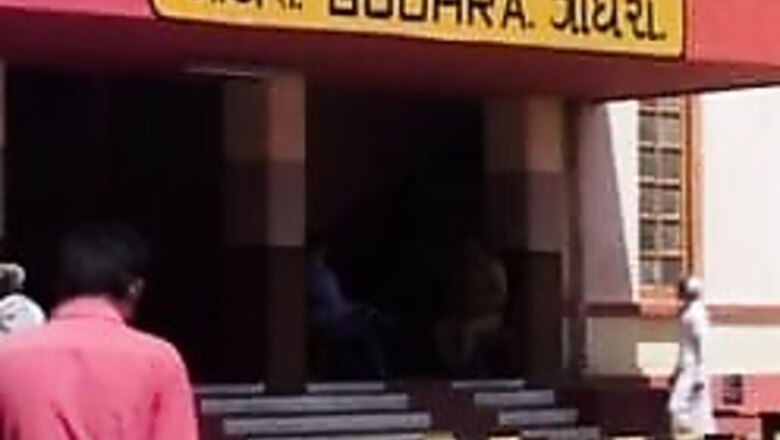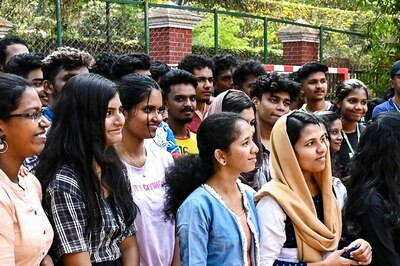
views
New Delhi: The Gujarat government on Tuesday suffered a setback in the Godhra train carnage case when the Supreme Court held that the findings of the POTA Review Committee to drop charges against the accused under the repealed anti-terror law would be binding on the government and the designated court.
The verdict was pronounced by a three-judge Bench headed by Chief Justice KG Balakrishnan on a bunch of petitions filed by family members of victims and accused in the Godhra case in which Gujarat government had supported the stand of the victims that review committee's finding automatically did not lead to the withdrawal of case under POTA.
"If the Review Committee expressed the opinion that there is no prima facie case for proceeding against accused, then the cases pending in court, even where cognisance have been taken by the court, shall be deemed to have been withdrawn with effect from the date of the issuance of direction by such committee," the Bench said.
It said on receiving the opinion against prosecuting the accused under POTA, it would not be obligatory for the Public Prosecutor to file an application under the provisions of the Code of Criminal Procedure (CrPC) for formal withdrawal of offences under the anti-terror law.
"The wording (in the provisions of law) is clear and unambiguous and does not contemplate or provide for further application of mind by the public prosecutor or grant of consent by the court under section 321 of CrPC," the Bench, also comprising Justices R V Raveendran and Dalveer Bhandari, said.
However, the Bench allayed fears that there was no remedy if the Committee reaches a wrong opinion by saying that "the opinion of the Committee is open to judicial review under section 226 of the Constitution (before the High Court)".
The CJI and Justice Ravindran said that "the availability of judicial review in the event of errors and abuse is a sufficient safeguard and deterrent against any wrong doing by the Review Committee".
PAGE_BREAK
However, Justice Bhandari, who concurred with the other two judges in a separate judgement, emphasised the need for judicial review of the POTA Review Committee's finding saying that "being an executive body, it might be swayed by political considerations".
"Owing allegiance to the executive, the review committee could be tempted to decide the outcome of the case based on that which is politically expedience. After all it is an executive body which is performing a purely judicial decision," he said.
Immediately after coming to power in 2004, the UPA government had repealed POTA by passing POTA (Repeal) Act in making a provision that all cases registered under the anti-terror law enacted by the NDA regime would be reviewed within a year.
The apex court held that under section 2(3) of the Repealing Act, the POTA court will have to comply with the findings of the committee without questioning its correctness.
"The court will not examine the correctness or propriety of the opinion nor exercise any supervisory jurisdiction in regard to such an opinion of the Review Committee," Balakrishnan writing the judgement for the Bench said.
Justice Bhandari justified the provision to hold as binding the Review Committee's findings as there had been instances of state governments misusing POTA.
"Subjecting the Central Review Committee's decision to the will of the state government public prosecutor, as is done when section 321 of CrPC applies, clearly goes against the very objective of POTA (Repeal) Act, 2004," Bhandari said.
While deciding the matter, the apex court noted that the Centre's stand was before it was slightly different than what it had taken in the Gujarat High Court.
"In so far as the Centre is concerned, we find that there is a slight shift from the stand taken before the High Court. In the High Court, the Centre contended that the power of the the Review Committee under the Repealing Act was subject to section 321 of CrPC," the bench said.
"But before us, the Centre has taken a stand which in principle supports the contention of the POTA accused though it has not challenged the decision of the High Court," it said.
Justice Bhandari said the Special Act (Repealing Act) must be deemed to supersede the provisions of General Act (CrPC).
PAGE_BREAK
The CJI said if Parliament wanted to make the provisions of section 2(3) of the Repealing Act subject to the section 321 of CrPC, it would have done by making appropriate provisions therefore.
"As that is not done, the plain meaning of the words of the legislation has to be given effect to," he said.
Elaborating the scope of the Repealing Act, Justice Bhandari said in the borderline case where there is some evidence that suggests that the case against the accused might exist, the Review Committee must allow the proceedings to continue before the designated court.
With this judgement, the decisions of the Gujarat High Court and the Madras High Court on the issue has been overruled as both the High Courts had held that the opinion of the Review Committee "will not have the effect of deemed withdrawal of case under POTA from the court."
The High Courts had held that the cases would be allowed to be withdrawn only after the designated POTA judge was satisfied that no case under the anti-terror law was made out against the accused.
The apex court did not agree that taking away the power from the designated court to decide the case on its merit and forcing the judge to comply with the findings of review committee would amount to judicial interference by the executive.
"Our short answer is that because of POTA (Repeal) Act has not removed judicial review under Article 226 or 136, the basic structure (judicial review) has not been destroyed," Justice Bhandari said.
The apex court held the provisions under the Repealing Act cannot be said to be in interference with the judicial power.
"By no stretch of imagination, such a provision can be termed as interference with judicial power, even assuming that such a provision in a live unrepealed statute may be considered as interference with judicial power," the CJI said.
On the legislative competence of Parliament to make such a provision making it binding on the designated court to accept the findings of the executive body, the apex court said "Parliament has the legislative competence to make repealing Act...it does not violate any constitutional provision".




















Comments
0 comment